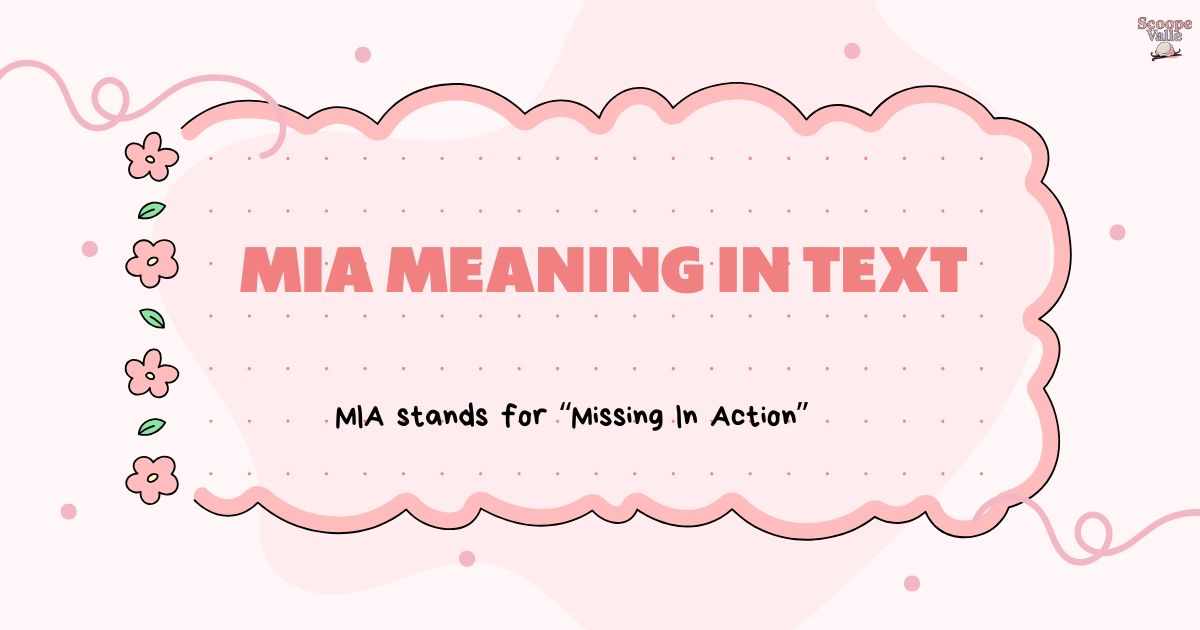Have you ever sent a message to a friend, only to see them posting funny memes on Instagram while leaving your chat on “seen”? That mysterious silence is often described with one simple term MIA. This slang pops up everywhere: texting, gaming, work chats, social media captions, and even funny TikToks. But what does MIA really mean, where did it come from, and how should you use it without sounding clueless?
In this ultimate guide, we’ll explore the meaning of MIA, its history, real-life examples, cultural variations, and the best ways to respond when someone calls you out for being “MIA.” Let’s dive in and decode this modern buzzword that keeps showing up in our conversations.
🔥 What Does MIA Mean? (Spoiler: It’s Not Just for Soldiers)
The abbreviation MIA originally stands for Missing In Action. This phrase began in the military to describe soldiers who disappeared during combat and whose whereabouts were unknown. Back then, it was a serious and emotional term used in war reports.
Fast forward to today, and MIA has taken on a lighter, playful meaning in digital communication. In texting or online chats, MIA now means someone has been absent or unresponsive for a noticeable amount of time. It’s often used jokingly to call out a friend who hasn’t replied, a co-worker who skipped a meeting, or a gamer who suddenly left mid-match.
Modern meanings of MIA include:
- “You disappeared without saying anything!”
- “Where have you been? We missed you!”
- “You’ve been off the radar for a while.”
It’s a quick way to express that someone has been unavailable or missing, but without the heavy emotional weight of its military origins.
Also read: CTFU Meaning in Text: Your Ultimate Guide to This Funny Acronym
📱 Real-Life Text Examples
MIA shows up in everyday conversations across texting, social media, gaming, and workplace chats. Here are some relatable examples to understand how people use it:
| Situation | Example Message | Tone |
|---|---|---|
| Friend ghosting | “Bro, you’ve been MIA for 3 days. Are you alive?” | Casual / Teasing |
| Gaming squad | “We lost because Jake went MIA mid-match!” | Annoyed / Playful |
| Work group chat | “Alex is MIA—did they skip the team meeting?” | Semi-professional |
| Family group | “Mom’s MIA again. Someone call her!” | Concerned / Funny |
| Romantic text | “You’ve been MIA… miss me?” ❤️ | Flirty / Cute |
🚀 From War Zones to WhatsApp: How MIA Went Viral
The journey of MIA from the battlefield to your smartphone is surprisingly fascinating:
- 1910s–1940s: MIA is strictly military jargon, used to report soldiers who went “missing in action” during wars.
- 2000s: Early internet forums adopt it humorously. People start saying “The thread starter is MIA” when someone stops posting.
- 2010s: Texting and social media apps like Facebook and Twitter bring MIA into casual conversation.
- 2020s: Gen Z and TikTok give MIA a new life. Memes, short videos, and viral trends use it to describe everything from missing friends to lost motivation.
Why did it catch on? Because it’s short, dramatic, and meme-friendly. Whether you’re talking about a friend who hasn’t replied, a coworker who skipped a Zoom call, or your own motivation disappearing, MIA fits perfectly.
🤔 MIA vs. Ghosting vs. AFK: What’s the Difference?
MIA isn’t the only slang for disappearing. People often confuse it with ghosting or AFK (Away From Keyboard), but there are key differences:
| Term | Meaning | Duration | Tone or Intention |
|---|---|---|---|
| MIA | Temporarily missing or unresponsive | Hours to a few days or weeks | Neutral or playful |
| Ghosting | Ignoring someone on purpose | Weeks or forever | Negative, hurtful |
| AFK | Away from keyboard in gaming/chat | Minutes to hours | Technical, neutral |
- MIA is often temporary and unintentional. Maybe someone was busy or distracted.
- Ghosting is deliberate it usually means someone wants to cut ties without explanation.
- AFK is gamer lingo for stepping away from the computer.
😂 How to Respond When Someone Calls You MIA
So, you’ve been called out for being MIA. What’s the best comeback? Your response depends on the relationship and the vibe of the conversation.
Here are some fun ways to reply:
- Funny: “Nah, I was on a top-secret mission. Mission complete.” 🕵️♂️
- Flirty: “Aww, you noticed? Miss me?” 😏
- Professional: “Apologies, I was swamped with work. Back now!” ✌️
- Playful: “Oops, my phone went MIA too!”
❌ What to avoid: A plain “Sorry, I was busy” can sound cold or boring. Add a little humor or warmth to keep the conversation friendly.
🌍 MIA Around the World (Not Everyone Uses It!)
MIA is popular in English-speaking countries, especially in the U.S., UK, Canada, and Australia. But not every culture uses it the same way:
- Spanish-speaking countries: People might say desaparecido, which means “disappeared,” but it sounds more serious.
- UK Gen Z: Sometimes prefer Gone AWOL (Absent Without Leave), another military-inspired term.
- Gaming communities: Many gamers say DC’d (Disconnected) instead of MIA.
- Asian cultures: Some use local slang or emojis instead of the term.
Be mindful when using MIA in global chats. In some cultures, comparing someone to a missing soldier might feel too intense or insensitive.
📉 MIA in 2024: Why It’s Bigger Than Ever
The term MIA isn’t fading. It’s growing stronger in 2024 and beyond. Here’s why:
- Quarantine Culture
During lockdowns, people joked about being MIA from social life. “I forgot how to socialize” became a meme, and MIA captured that feeling perfectly. - Remote Work
In work-from-home setups, employees often vanish from Slack or Zoom. Saying “The boss is MIA” is now a common inside joke. - TikTok Trends
TikTok creators use MIA to describe everything from exes to missing homework. It’s short and catchy, perfect for captions. - Mental Health Conversations
People sometimes say “My motivation is MIA” to describe burnout or low energy in a playful way.
Thanks to social media and remote lifestyles, MIA has become a universal digital shorthand for absence.
❌ When NOT to Use MIA
While MIA is fun, it’s not always appropriate. Avoid using it in these situations:
- Serious Disappearances: If someone is genuinely missing, using MIA can sound insensitive.
- Formal Emails: In professional communication, say “unavailable” or “out of office” instead.
- Sensitive Friends: If someone struggles with anxiety or abandonment issues, teasing them with MIA might hurt their feelings.
🤖 FAQs (Gen Z Edition)
If I’m MIA for three days, am I officially dead?
Only on Twitter. In real life, you’re fine—just late to reply.
Is MIA the same as ghosting?
Nope. Ghosting is permanent and intentional; MIA is usually temporary.
Can I use MIA for objects, not people?
Yes! Example: “My motivation is MIA” or “My Wi-Fi went MIA.”
Is MIA rude?
Not usually. It’s more playful than mean, unless someone uses it in a harsh way.
Can I say my dog is MIA?
Sure, if it’s a funny situation like your dog hiding with your pizza.
🎯 Key Takeaways
- MIA stands for Missing In Action, originally a military term but now a fun way to say someone is absent.
- It’s perfect for texting, gaming, and social media when someone disappears for a while.
- Don’t confuse MIA with ghosting or AFK—the meaning and vibe are very different.
- Always use it in casual, light-hearted contexts. Avoid serious or formal situations.
- A witty comeback keeps the conversation friendly when someone calls you MIA.
Final Thoughts
Language evolves with culture, and MIA is a perfect example of how a serious military phrase can transform into a light-hearted internet slang. Whether you’re texting a friend, posting on TikTok, or joking in a group chat, MIA is a quick and fun way to say “Where have you been?”
Tylor John, with five years’ experience, beautifully crafts information on all topics and inspiring readers worldwide with positivity, faith, creativity, love, and hope.

